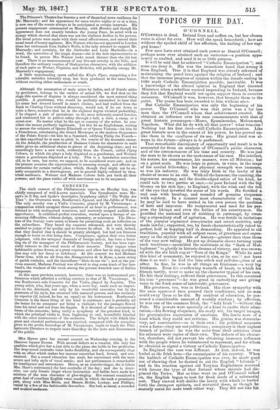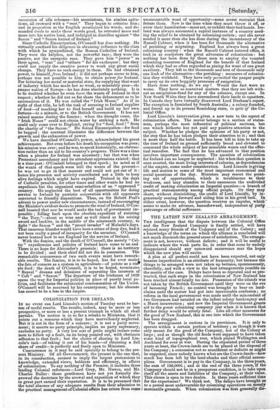TOPICS OF THE DAY.
O'CONNELL.
O'CormELL is dead. Ireland lives and suffers on, but her chosen voice is silent for ever. How will she speak henceforth ; how act without the spoiled child of her affection, the darling of her rag- ged home? Few men have ever attained such power as Daniel O'Connell; perhaps none ever attained such an eminence—a position appa- rently so exalted, and used it to so little purpose. It will be said that he achieved " Catholic Emancipation "; and none can deny it. His was the immediate hand that wrung it from England. True it is that England was already ashamed of maintaining the penal laws against the reliaion of Ireland ; and that the immense progress of opinion within the decade ending in 1830 made Catholic Emancipation possible, inevitable. It was a knowledge of the altered opinion in England that daunted Ministers when arebellion seemed impending in Ireland, because they felt that England would not again support them in coercive measures. O'Connell it was, however, that brought them to the point. The praise has been awarded to him without stint.
But Catholic Emancipation was only the beginning of his power. The O'Connell who won that prize was a far less man than the O'Connell whom that achievement created. He obtained an influence over his race commensurate with that of great historic personages—Moses, Epaminondas, Mohammed, Napoleon. What did he do with all that power? what remains ? Nothing but his first deed—still Catholic Emancipation. Like great historic men in the extent of his power, he has proved un- like them in the smallness of its use. His grand deed was al- ways in the future—always to be performed. That remarkable discrepancy of opportunity and result is to be accounted for from an analysis of O'Connell's public character, and of the circumstances of his time and country. He was just the man to be chosen as the spokesman of his race. His intellect, his nature, his countenance, his manner, were all Milesian ; but on a giant scale. He was large in person, in voice, in the scope of his cordial fellowship; his physical strength was immense, so was his industry. He was truly Irish in the laxity of his choice of means to an end. With all the humour, the cunning, the ingenuous seeming, and the double-edged satire of his kind, he could talk to two parties at once,—to poor Ireland with the big blarney on his rich lips; to England, with the wink and the roll of the eye that inverted the sense of his words. He fortified a real case with humbug, and rounded off genuine eloquence with cajolery. In a manner most characteristic of his race, , he may be said to have united in his own person the qualities of hero and impostor. He reciprocated and used for his pur- pose the likings and even the foibles of his countrymen. He gratified the national love of dabbling in patronage, by creat- ing a stipendiary staff of agitation. He was fertile in imitations of the popular organized conspiracies and secret societies, only made lawful; supported, too, by funds characteristically raked to- gether, half in begging half in demanding. He appealed to old traditions, popular with all subject races, of greatness and supre- macy in the mythic periods of history—greater then than those of the race now ruling. He got up dramatic shows turning upon such traditions—assembled the multitude at the "Rath of Mul- laghmast " to glorify in historic dreams of victory, and was crown- ed with the old Irish cap at " Tara of the Kings.' While he used this kind of mummery, he enjoyed it also, or he coula not have done it so well : he had the true relish and self-deception of an aStor. In fine, he was in all things an Irishman—a very big Irishman. Even his overflowing warmth of heart, to which his friends testify, went to make up the character typical of his race. He felt their feelings, suffered their grievances. In this consisted his true "greatness "—he was great in embodying and giving voice to the Irish sense of intolerable grievances. His greatness, too, was in Ireland. His close sympathy with the once oppressed race secured their confidence, and no man could sway them as he did. By accident of education, he pos- sessed a considerable amount of worldly wisdom ; by affection, be was one of the common Irish, the wild Irish "—without the Pale. His powers were specially of a kind to excite their admi- ration,—his flowing eloquence, his ready wit, his turgid images, his gesticulative expression of emotions. His faults were of a kind which they could not criticize. His genius was denuncia- tory, not constructive—so is their own : his political measures were a farce—they are not politicians ; conspiracy is their highest branch of politics : he was the safer from their criticism since his schemes were copies of their own. The defects of his charac- ter, therefore did not prevent his obtaining immense influence with the people whom he volunteered to represent, and for whom he obtained so signal a victory as Catholic Emancipation. In England the case was different. At first, indeed, he was hailed as the Irish hero—the emancipator of his country. When the hubbub of Catholic Emancipation was over, he made good use of showing that he desired to aid the English " Liberals " : and in the reaction against old Toryism Englishmen received with favour the type of that Ireland whose misrule had dis- graced the Tories. But as time went on and O'Connell talked on, the English began to look for fresh deeds of a substantial sort. They viewed with dislike the laxity with which he hurled forth the strongest epithets, and retracted them, as though he scarcely oared for were truth either way. They did not like his succession of idle schemes—his associations, his aimless agita- tions, all crowned with a "rent." They began to criticize him ; and in proportion as the English scrutinized his words, and de- manded deeds to make those words good, he retreated more and more into his native land, and indulged in diatribes against "the Saxon" and "Saxon hatred of Ireland."
Since Catholic Emancipation, O'Connell has done nothing. He virtually confined his diligence in obtaining influence to the class with which he sympathized, the Roman Catholics of Ireland. They were the helpless, not the powerful race ; they were the passive, not the energetic race. They gave him " power " as their agent, " rent " and " tribute " for his exchequer ; but they could not supply the creative power to work any great social change. They have no such energy in them. He had obtained power, to himself,from Ireland ; it did not perhaps occur to him, perhaps was not possible to him, to obtain power/or Ireland. For bettering her social or material state, for supplying that want of industry which has made her so weak, so miserably poor—the pauper nation of Europe—he has done absolutely nothing.. It is to be doubted whether he even knew the wants of Ireland in that respect ; whether he did not so far share the debasement as to be unconscious of it. He was called the "Irish Moses." As if in right of that title, he left the task of securing to Ireland supplies of food—of teaching her to feed herself and build up her own fortune—to a miracle, or to the British Government. It has not rained manna during the famine; when the drought came, the " Irish Moses" could not obtain water by striking a rock. He could only come over to England, crying for " food, food I " from the charity of "the Saxon." He forced Emancipation—for food he begged : the contrast illustrates the difference between the growth and the exhaustion of power. We have described O'Connell's power, acknowledged his great achievement. But even before his death his occupation was gone; his mission was over; and he was, to speak historically, an obstruc- tion rather than an aid to his country's progress. There was a time when a pleader for Ireland was necessary ; but that was when Protestant ascendancy and its attendant oppressions existed: that is a time past : O'Connell belonged to that epoch ; he acted as if the wants of that epoch were still the wants of the present— he was set to go in that manner and could not get out of it : hence his presence and activity contributed not a little to keep alive feelings which might have expired. Trained in the days of Catholic penalties, for other times and other wants be had no expedients but the organized semi-rebellion of an " oppressed " country. He neglected the best of all opportunities for doing service to Ireland by patriotic cooperation with old opponents converted to friendly dispositions. Thus, on Sir Robert Peel's advent to power under new circumstances, instead of encouraging the Minister's evident desire to promote the weal of Ireland, O'Con- nell boasted that now he would make the task of government im- possible ; falling back upon the obsolete expedient of resisting "the Tory,"—about as wise and as well timed as his seizing sword and buckler, in the middle of the nineteenth century, to fight " the Saxon" and the "proud invader" of Malachi's days. That immense blunder would have been a crime of deep dye, had it not been really a proof of incapacity for the occasion. O'Connell never learned how to use England for the service of Ireland. With the famine, and the death of O'Connell, the merely "Cel- tic" expediencies and policies of Ireland have come to an end There is no hope for Alexander's generals : there is no territory to be divided ; and their chief did not die in possession. The remarkable concurrence of two such events must have remark- able results. The famine, it is to be hoped, has for ever sealed the fate of conacre as a system in agriculture—of potato as a stag pie food : the death of O'Connell, it is to be hoped, terminates " Repeal " dreams and delusions of separating the interests of " Celt " and "Saxon." The departure of the Irishman of 1829 opens the way for Imperial policies in place of purely local po- licies, and facilitates the substantial consummation of the Union. O'Connell will be mourned by his countrymen; but his absence has ceased to be a lose to the empire.



























 Previous page
Previous page